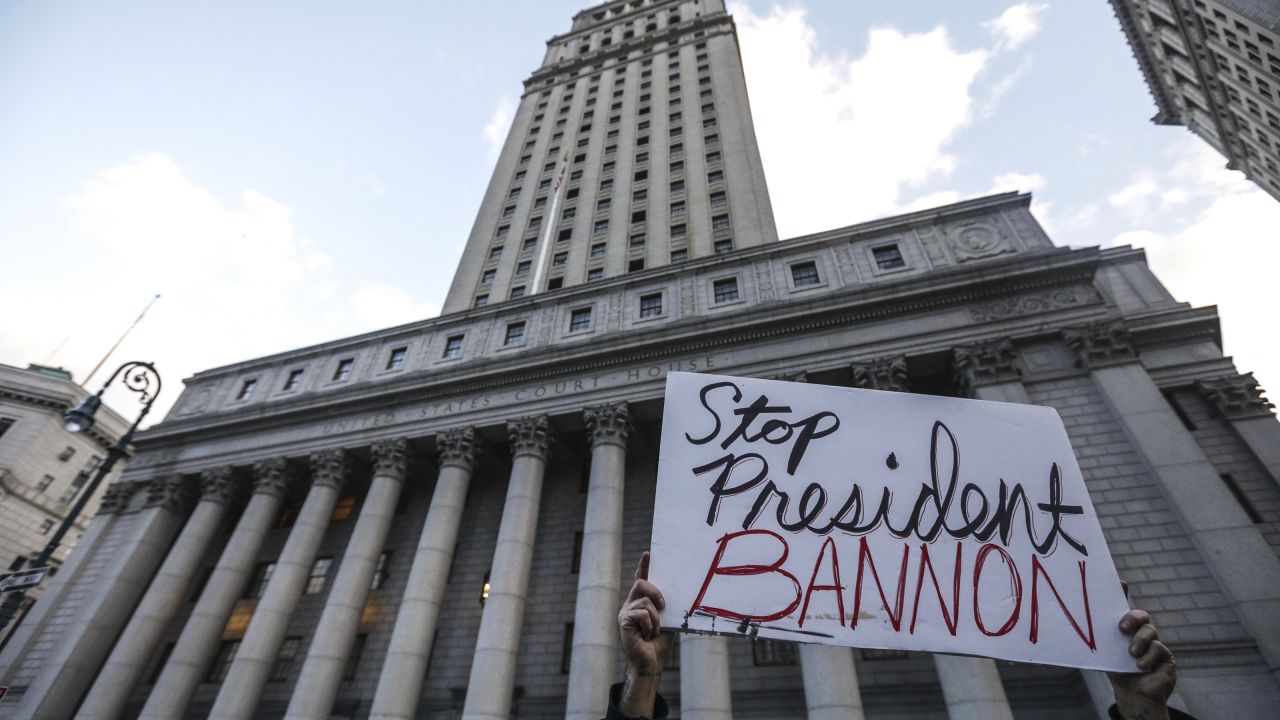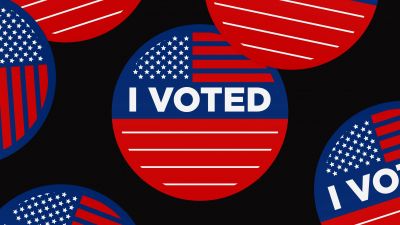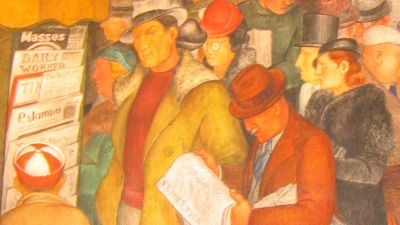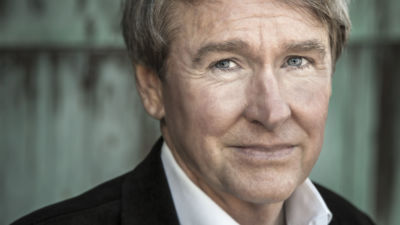
A demonstrator outside Federal Plaza in New York on Sunday, Jan. 29, 2017. (Photographer: Jeenah Moon/Bloomberg via Getty Images)
We produce this news digest every weekday. You can to receive these updates as an email newsletter each morning.
The rise and rise of Steve Bannon –> The former head of extreme right-wing Breitbart news is ever-increasing his power and influence in the White House. “While the American public’s attention was focused on the thousands of families whose lives were disrupted and even put at risk by Trump’s ban on Muslims entering the USA, the US Director of National Intelligence and the Chairman of the Joint Chiefs of Staff were removed from the list of permanent attendees in the President’s National Security Council,” author Corey Doctorow writes for the blog Boing Boing. “They were replaced with white nationalist Trump adviser Steve Bannon. Trump announced the changes shortly after speaking with Putin for an hour.”
Bannon’s elevation is worrying for many reasons, national security among them. “The last place you want to put somebody who worries about politics is in a room where they’re talking about national security,” Leon Panetta, the former White House chief of staff, defense secretary and CIA director, told The New York Times. “In terms of real influence, Mr. Bannon looms above almost everyone except the president’s son-in-law, Jared Kushner, in the Trumpian pecking order,” write The Times’ Glenn Thrush and Maggie Haberman in a story based on interviews “with two dozen Trump insiders and current and former national security officials.”
Purge –> It was initially reported as a mass-resignation, but it turns out that top-level officials at the State Department were purged, according to The Guardian’s Julian Borger. The mass firing was ordered by the Trump administration, and came just before the travel ban was announced. “The motives behind the sudden wave of sackings are unclear,” Borger writes. “Some of the outgoing diplomats saw it as one more sign of chaos from a new administration that is desperately short of experience. Others saw it as a wrecking operation, aimed at debilitating the State Department at a time of upheaval: while the White House planned its ban on entry for people from a list of Muslim countries, and while Trump frames a new foreign policy before [Secretary of State Rex] Tillerson arrives in his post.”
Meanwhile, as a result of Trump’s executive order Friday night, throughout the weekend mass protests erupted at airports and courthouses across the United States and the world, and lawyers and translators were at the ready offering assistance to passengers who were detained by US customs officials. John Knefel at Rolling Stone covered Saturday’s huge demonstration at JFK airport in New York, and Ben Dreyfuss at Mother Jones has an illustrated summary of Sunday’s protests. More are planned for today, including a rally at 6 p.m. today by House and Senate Democrats in front of the Supreme Court.
But the White House calls travel ban a success –> In a phone call with reporters last night, White House staff said they were pleased with the travel ban’s rollout. “It really is a massive success story in terms of implementation on every single level,” one administration official said of an order that created chaos across government agencies and resulted in dozens of travelers being detained and sometimes held in inhumane conditions; one Somali woman and her two young children were detained for 20 hours at Dulles airport without food, Rachel Vorona Cote reports for Jezebel.
Don’t be fooled –> The ban mostly targets visitors from seven predominantly Muslim countries — Iran, Iraq, Libya, Somalia, Sudan, Syria and Yemen — and Rudy Giuliani, who says he helped write the order, made the law’s intentions clear in a television interview. It was formulated as a de facto ban on Muslim immigration, making good on Trump’s race-baiting campaign promises. “When he first announced it, he said ‘Muslim ban,'” Giuliani said on Fox News (here via The Hill). “He called me up, he said, ‘Put a commission together, show me the right way to do it legally.’” (Trump repeatedly has reassured Christian leaders that Christians from these countries will be allowed in. Yet as Ruth Graham writes at Slate, Christian leaders remain “nearly unanimous” in their opposition to the ban.)
A selective ban? –> Note, too, that not all Muslim countries were included in Trump’s ban. There were a few the president didn’t want to anger. “President Trump omitted from his ban a number of other predominantly Muslim nations where his company has done business.” With his colleague Norman L. Eisen, Richard Painter, a law professor and former ethics expert for George W. Bush, observes at The New York Times: “… A vast majority of people living in these countries, like the people living in the seven subject to the immigration ban, are peaceful and law abiding. But… three [of these] countries [Saudi Arabia, Egypt and the UAE] have exported terror to the United States in the past. They accounted for 18 of the 19 terrorists who perpetrated the Sept. 11 attack on American soil (an attack which was directed by another Saudi, Osama Bin Laden, with the assistance of an Egyptian, Ayman al-Zawahri).”
Another big lie behind the travel ban –> “People are pouring in from regions of the Middle East,” Trump said during his campaign. “We have no idea who they are, where they come from.” This is not true. In fact, we have quite a solid idea of where they’re coming from. It is very difficult for refugees to come to the United States — more difficult than it is for them to come to many European countries. Of the millions who have left Syria during the country’s apocalyptic civil war, only a few thousand were allowed into America during the Obama presidency.
At Politico magazine, Mostafa Hassoun, a Syrian refugee whose family arrived in America after five years in limbo, describes the process, which involves multiple, aggressive interrogations and deep background checks by first the UN and then agencies of the US government. “By the time I received my offer to live in the United States, the US officials in charge of my case file knew me better than my family and friends do,” Hassoun writes. “In fact, there is probably nobody in the world that knows me better than the United States government.”
Congress’ role –> “For political and moral reasons, it is important to remember that very little of what the President is now doing is possible without a compliant Congress,” Josh Marshall writes at Talking Points Memo. “Executive orders in most cases fill in the blanks that legislation leaves to the president’s discretion. So this isn’t just a matter of the sway a Congress of the president’s party can exercise over him, which is substantial. In many or most cases, executive orders and actions can literally be overruled with new legislation.”
Related: Vox has a list of the hundreds of Republicans in Congress who have yet to take a position on the immigration ban.
Corporations’ role –> Though some in Silicon Valley made noise about the immigration ban — Lyft donated $1 million to the ACLU and Google’s Sergey Brin joined protesters in San Francisco — corporate America has largely been silent, Tom Gara reports for Buzzfeed. “Take Wall Street, where big banks spend tens of millions every year pressuring Washington on the things they consider important. Representatives of Bank of America, Goldman Sachs and Morgan Stanley all declined to comment or did not reply yesterday when contacted by reporters.”
Here’s another way Congress preemptively covers its backside –> Eric Pianin at The Fiscal Times (via Business Insider): “After congressional ethics experts, voters, and President-elect Donald Trump forced House Republicans to back down last week from a rules change that would have eviscerated the independent Office of Congressional Ethics, one important sentence quietly slipped through another rule change. That sentence enables individual members to hide official documents that could prove embarrassing or even incriminating if they were suddenly investigated by the ethics office or the Justice Department for criminal activity.”
Bend or break? –> Brian Beutler at The New Republic: “Ten days into President Donald Trump’s administration, liberals are wondering whether the nation can endure four years of the kind of ruin the president is already inflicting. The challenge is to not replicate the Republican habit of mischaracterizing, intentionally or otherwise, every offensive thing Trump does as a threat to national integrity. It is in sorting through the mess of policies, pronouncements, leaks and other unassorted chaos to distinguish between bad policies or mismanagement and genuine threats to the constitutional order—and then to imagine what the country will look like after four years of it all. Even under great strain to resist hyperbole, the picture that emerges is ugly.”
Morning Reads was compiled by John Light and edited by Michael Winship. See a story that you think should be included in Morning Reads? Tell us in the comments!
We produce this news digest every weekday. You can to receive these updates as an email newsletter each morning.



